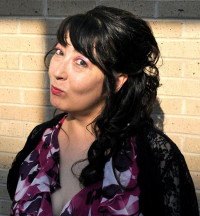
Lee Ann Roripaugh, this year’s Mary Rogers Field and Marion Field-McKenna Distinguished University Professor for Creative Writing, was invited to DePauw University to teach a Poetry Writing class in Spring 2022.
According to DePauw website, the Mary Rogers Field and Marion Field-McKenna Distinguished Professorship “brings nationally recognized and practicing writers to DePauw as visiting faculty members” with endowment from J. David Field.
Joe Heithaus, professor of English, said the creative writing faculty recommends a writer to the Vice President of Academic Affairs each year.
“We have tried over the years to honor each genre of creative writing by finding renowned fiction writers, poets, creative nonfiction writers and a dramatist,” Heithaus said.
According to Heithaus, the professorship has brought nationally recognized writers to the English department. The list includes fiction writers such as Antonya Nelson and Rick Bass, creative nonfiction writers like Ian Frazier and Dinty Moore, and poets Rodney Jones and Marilyn Chin.
“We recently found out our first Field Chair, poet Crystal Williams, is now President of The Rhode Island School of Design,” Heithaus said.
It has been an honor for Roripaugh to join the list of writers serving as DePauw field professors. “DePauw has such an amazing Creative Writing program. The professors here are all incredibly well published and diverse and exciting writers,” she said.
Prior to teaching a semester at DePauw, Roripaugh has been a professor of Creative Writing at the University of South Dakota. She said the school has a Creative Writing track at the undergraduate level that is built on a traditional English degree program, but there is not an opportunity to take as many creative writing classes as DePauw offers.
At DePauw, Roripaugh is teaching a 300-level class in poetry writing that explores the relationship between poetic form and content. Her students address questions relating to the potential shape of a poem, the way form and content work together, and so on.
Roripaugh thinks DePauw students are “fantastic.” “It's just sort of exciting to see the kind of work that sort of springs out of these different kinds of artistic or formal challenges. So it's been great,” she said.
Talking about the meaning of creative writing, Roripaugh thinks it changes one’s relationship with language on a personal level. “When you do expository or academic writing, that's a very particular kind of form. And linguistic register, and it's sort of formulaic, and of course, it's less personal. But when you do creative writing, you really become so attentive to each individual word choice, or whether you want to put a comment in or take a copy.,” Roripaugh said.
Even if students do not end up being creative writers, according to Roripaugh, the relationship that they build with language improves their writing skills and allows them to express themselves authentically.
For Roripaugh, creative writing enables her to be her best self and it feels like a privilege to be able to express herself with writing. She thinks it exposes us to diverse viewpoints because it gives an opportunity to read about and understand things that we have not experienced before.
“I think it is a place where you can learn radical empathy and radical compassion,” Roripaugh said. “Writing can then act as a mirror in which perhaps, maybe you have not had the experience of seeing your viewpoints, or your experience reflected back to you…There's that sense of feeling seen or heard or empowered. And I think both of those things are so important as we sort of develop as human beings.”
